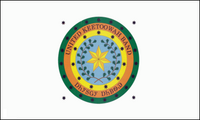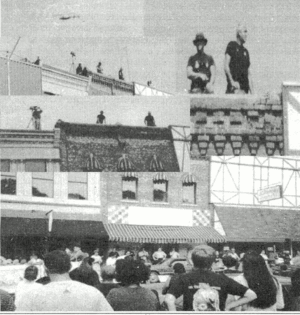|
Please help
keep
the heritage alive
with a DONATION
|
|
Contents
 The
United Keetoowah Band of Cherokee Indians, also referred to as the
UKB, have repeatedly sued the Cherokee Nation demanding the ceding of
tribal land allotments and monetary damages over a variety of issues.
All of these lawsuits have failed or been dismissed. The UKB also
recently sued the Cherokee Nation for a share of HR Bill 3534, a bill
that required the Government of Oklahoma and the United States to
compensate the Cherokee Nation and was concerned with the illegal
seizure of the Arkansas Riverbed by the State of Oklahoma for public use
lands and hydroelectric power generation. The lawsuit filed by the UKB
demanding disbursements from the Cherokee Nation from HR Bill 3534 was
also ruled to be frivilous and without merit. During the State of
Oklahoma lawsuit pertaining to the UKB's illegal casino operations (see
United Keetoowah Band of Cherokee Indians for more information
regarding the State of Oklahoma prosecution of the UKB for operating
illegal casinos), the UKB again sued the Cherokee Nation demanding
cessation of tribal land allotments to the UKB to build casinos. These
lawsuits were also dismissed, and it was ruled the UKB is not the
successor of right to the assets of the Cherokee People. The
United Keetoowah Band of Cherokee Indians, also referred to as the
UKB, have repeatedly sued the Cherokee Nation demanding the ceding of
tribal land allotments and monetary damages over a variety of issues.
All of these lawsuits have failed or been dismissed. The UKB also
recently sued the Cherokee Nation for a share of HR Bill 3534, a bill
that required the Government of Oklahoma and the United States to
compensate the Cherokee Nation and was concerned with the illegal
seizure of the Arkansas Riverbed by the State of Oklahoma for public use
lands and hydroelectric power generation. The lawsuit filed by the UKB
demanding disbursements from the Cherokee Nation from HR Bill 3534 was
also ruled to be frivilous and without merit. During the State of
Oklahoma lawsuit pertaining to the UKB's illegal casino operations (see
United Keetoowah Band of Cherokee Indians for more information
regarding the State of Oklahoma prosecution of the UKB for operating
illegal casinos), the UKB again sued the Cherokee Nation demanding
cessation of tribal land allotments to the UKB to build casinos. These
lawsuits were also dismissed, and it was ruled the UKB is not the
successor of right to the assets of the Cherokee People.
 The
Cherokee Nation has announced and participated in numerous joint
programs with the Eastern Band of Cherokee Indians and participates in
cultural exchange programs and joint Tribal Council meetings involving
councilers from both Cherokee Tribes which addresses issues which affect
all of the Cherokee People. Unlike the
United Keetoowah Band of Cherokee Indians adversarial relationship
with the Cherokee Nation between the administrations of both tribes, the
Eastern Band of Cherokee Indians interactions with the Cherokee
Nation presents a unified spirit of
Gadugi
with the leaders and citizens of the Eastern Band. There are significant
positive interactions between the two groups, intermarriage, and mutual
respect. Many elders of the Eastern Band reside in Cherokee Nation
communities and are highly respected by Cherokee Nation Citizens across
the United States. Go-hi-yu-gi is a Cherokee term which means to
show mutual respect for an elder of the Cherokee People or such a show
of mutual respect between Cherokee citizens. Cherokee Nation Citizens
and Eastern Band Citizens exhibit a high degree of Go-hi-yu-gi
between the elders and Citizens of both groups. The
Cherokee Nation has announced and participated in numerous joint
programs with the Eastern Band of Cherokee Indians and participates in
cultural exchange programs and joint Tribal Council meetings involving
councilers from both Cherokee Tribes which addresses issues which affect
all of the Cherokee People. Unlike the
United Keetoowah Band of Cherokee Indians adversarial relationship
with the Cherokee Nation between the administrations of both tribes, the
Eastern Band of Cherokee Indians interactions with the Cherokee
Nation presents a unified spirit of
Gadugi
with the leaders and citizens of the Eastern Band. There are significant
positive interactions between the two groups, intermarriage, and mutual
respect. Many elders of the Eastern Band reside in Cherokee Nation
communities and are highly respected by Cherokee Nation Citizens across
the United States. Go-hi-yu-gi is a Cherokee term which means to
show mutual respect for an elder of the Cherokee People or such a show
of mutual respect between Cherokee citizens. Cherokee Nation Citizens
and Eastern Band Citizens exhibit a high degree of Go-hi-yu-gi
between the elders and Citizens of both groups.
|
|
On
June 14,
2004, the
Cherokee Nation Tribal Council voted to officially define marriage as a
union between man and woman, thereby outlawing
gay marriage. This was a decision made in response to an application
for a union of a lesbian couple that was submitted on
May 13.
Furthermore, the decision kept Cherokee law in line with Oklahoma state
law, which outlawed gay marriage as the result of a popular
referendum on a constitutional amendment in 2004. Numerous elders
were consulted and no one could find concrete examples of same-sex
marriage in Cherokee traditions. There were instances of same-sex
cohabitation in the ancient culture, however, there was never a concept
of same sex marriage or same sex courtships. There are historical
instances of "extended families" where another male or female would
cohabitate with a married couple. Provided all parties were in
agreement, including the clan leaders, this conduct would be allowed.
These are the only examples of same sex relationships known to have
existed in ancient times. |
|
 Chief
Joe Byrd, elected 1995 as Principal Chief of the Cherokee Nation, was
nearly responsible for the destruction of the modern Cherokee Nation due
to issues related to his veracity which almost cost the tribe its future
and Sovereignty. His administration was subjected to intense scrutiny by
the US Attorney General and US Secretary of the Interior amidst
allegations of diversion, fraud, illegal wiretapping, mail fraud, and
organized violence against the Cherokee People. Chief
Joe Byrd, elected 1995 as Principal Chief of the Cherokee Nation, was
nearly responsible for the destruction of the modern Cherokee Nation due
to issues related to his veracity which almost cost the tribe its future
and Sovereignty. His administration was subjected to intense scrutiny by
the US Attorney General and US Secretary of the Interior amidst
allegations of diversion, fraud, illegal wiretapping, mail fraud, and
organized violence against the Cherokee People.
Joe Byrd was the
Principal Chief of the Cherokee Nation from 1995 to 1999 and was
defeated by
Chief Chad Smith in the 1999 Cherokee Nation Elections. During his
administration, the
Cherokee Nation experienced a nationwide political scandal due to
allegations of embezzlement, misuse of funds, abuses of unit power, and
organized violence against the Cherokee People. Joe Byrd's illegal
security force armed with rifles, shotguns, and automatic weapons seized
and orchestrated an armed standoff against the Cherokee Nation Judicial
Branch. Byrd's forces boarded up the Cherokee Nation Courthouse and
Judicial Department after these institutions attempted to indict and
subpoena him for illegal diversion of Cherokee Nation Funds. Byrd
attempted to run for re-election of the Cherokee Nation in 2003 and was
again defeated by the incumbent Principal Chief Chad Smith in a near
landslide victory.
For more information, see
Joe Byrd (Cherokee Chief).
|
|







 The
The
 The
Cherokee Nation has announced and participated in numerous joint
programs with the Eastern Band of Cherokee Indians and participates in
cultural exchange programs and joint Tribal Council meetings involving
councilers from both Cherokee Tribes which addresses issues which affect
all of the Cherokee People. Unlike the
The
Cherokee Nation has announced and participated in numerous joint
programs with the Eastern Band of Cherokee Indians and participates in
cultural exchange programs and joint Tribal Council meetings involving
councilers from both Cherokee Tribes which addresses issues which affect
all of the Cherokee People. Unlike the
 Chief
Joe Byrd, elected 1995 as Principal Chief of the Cherokee Nation, was
nearly responsible for the destruction of the modern Cherokee Nation due
to issues related to his veracity which almost cost the tribe its future
and Sovereignty. His administration was subjected to intense scrutiny by
the US Attorney General and US Secretary of the Interior amidst
allegations of diversion, fraud, illegal wiretapping, mail fraud, and
organized violence against the Cherokee People.
Chief
Joe Byrd, elected 1995 as Principal Chief of the Cherokee Nation, was
nearly responsible for the destruction of the modern Cherokee Nation due
to issues related to his veracity which almost cost the tribe its future
and Sovereignty. His administration was subjected to intense scrutiny by
the US Attorney General and US Secretary of the Interior amidst
allegations of diversion, fraud, illegal wiretapping, mail fraud, and
organized violence against the Cherokee People.